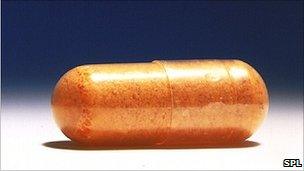Vitamin B12 link to Alzheimer's backed by study
- Published

Evidence is mounting that levels of vitamin B12 may be connected to the risk of developing Alzheimer's disease.
A study of 271 Finns found those with the highest levels were the least likely to be diagnosed with dementia.
However, an Alzheimer's charity said despite the findings, published in the journal Neurology, it was "too early" to think about taking supplements.
It called for more research into the protective power of vitamins such as B12 - found in meat, fish and eggs.
Vitamin B12 can also be found in milk and some fortified cereals.
Alzheimer's has been linked to B vitamins for some years, and scientists know that higher levels of a body chemical called homocysteine can raise the risk of both strokes and dementia.
Homocysteine levels can be lowered by increasing the amount of vitamin B12 in the blood.
A recent trial found that "brain shrinkage", which has been associated with Alzheimer's, was slowed in older people taking high doses of vitamins, including B12.
The volunteers for the latest study, carried out by scientists from the Karolinska Institute in Sweden, were all aged 65 to 79, and did not have dementia at the start of the study.
Over the next seven years, 17 of them were diagnosed with the condition, and researchers were able to work out whether high or low levels of the active component of B12 had made any difference.
Again, those with high levels of homocysteine appeared to be at greater risk, and those with the highest levels of the vitamin appeared to be at lower risk.
Professor Helga Refsum, from the University of Oslo, another B-vitamin researcher, said that the study was "further evidence" that low levels of B12 were linked to Alzheimer's.
"Though relatively small, with few cases of dementia, it should act as another incentive to start a large scale trial with homocysteine-lowering therapy using B vitamins to see whether such a simple treatment may slow the development of Alzheimer's or other dementia."
Rebecca Wood, the chief executive of the Alzheimer's Research Trust, was cautious about the findings.
She said: "It might be tempting at this stage to stock up the cupboard with B vitamin in the light of recent findings - it remains too early to do that at this stage.
"The strongest evidence we have for reducing dementia risk is to eat a healthy, balanced diet, take moderate exercise, and keep cholesterol and blood pressure in check, particularly in mid-life."
A separate study offered some encouragement to those looking for future treatments for the disease.
A treatment to lower levels of a protein called "STEP" in mice bred to develop a condition similar to Alzheimer's disease appeared to reverse some of their memory and learning problems.
The Alzheimer's Research Trust said it was too soon to know whether a similar treatment might be viable in humans.
- Published8 September 2010
- Published7 October 2010
- Published15 October 2010